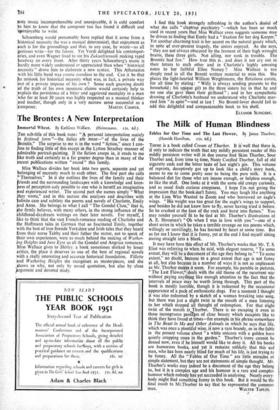The Milk of Human Blindness
Fables for Our Time and The Last Flower- By James Thurber. (Hamish Hamilton. I2s. 6d.) Fables for Our Time and The Last Flower- By James Thurber. (Hamish Hamilton. I2s. 6d.) THERE is a book called Cream of Thurber. It well that there is, if only to indicate the truth that any mildly persistent reader of this mildly persistent writer will in due course find Skim Thurber, Sour Thurber and, from time tq time, Nasty Curdled Thurber, full of old cigarette ends and the bitter taste of last night's gin. This volume of reprints, deceptively got up to look like a child's story book, seems to me to come pretty near to being the pure milk. It is a balanced diet for those who are insane enough, or helpless enough, to like the stuff. One looks at it with the same old creepy curiosity, and as usual finds curious creepiness. I hope I'm- not giving the - impression that the book4sn't funny. You may laugh like anything at the Lion Who Wanted to Zoom and who borrowed an eagle's wings. "His weight was too great for the eagle's wings to support, and besides he did not know how to fly, never having tried it before. So he crashed at the foot of the rock and burst into flames." You may render yourself fit to be tied at Mr. Thurber's illustrations of A. E. Housman's " Oh when I was in love with you "—one of a short series in which he takes a terrible revenge on ten poems which, willingly or unwillingly, he has learned by heart at some time. But as for me I know that it is funny, yet at the end I find myself sitting staring straight into a blank.
It may have been this effect of Mr. Thurber's works that Mr. T. S. Eliot was referring to when he said, with elegant reserve, " To some extent, they will be adocument of the age they belong to." "To some extent," no doubt, because to a great extent that age is not funny at all, but also because in a number of ways it is not as unpleasant as Mr. Thurber makes it seem. For example, his parable in pictures, " The Last FlOwerr deals with the old theme of the recurrent war without paying anything like enough attention to the fact that the intervals of peace may be worth living through. This part of the book is mostly horrible, though it is redeemed by the occasional appearance of a pack of enthusiastic dogs. For a moment I thought it was also redeemed by a sketch of a woman breaking into song, but there was just a slight twist in the mouth of a man listening to her which stopped all thought of redemption. For that slight twist of the mouth is Thurber. There is no escaping it even in those incongruous passEkes of clear beauty which escapists like to think they have found at times—for example in his phrase somewhere in The Beast in Me and Other Animals in_which he says that life, which was once a plentiful wine, ifnow a rare brandy, or in the fable in the present volume about "a white unicorn with a golden horn quietly cropping roses in the garden." Thurber's irony cannot be denied now, even if he himself would like to deny it. AU his books are humorous books, and yet it remains unlikely that this sad man, who has been nearly blind for much of his life, is just trying to be funny. All the " Fables of Our Time " are little miracles of simple statement, but they are not statements of simple thought. Mr. Thurber's works may indeed be a document of the age they belong to, but it is a complex age and his humour is a rare and complex humour which nobody has yet succeeded in analysing. Nearly every- body might find something funny in this book. But it would be the final insult to Mr.Thurber to say that he represented the common


































 Previous page
Previous page